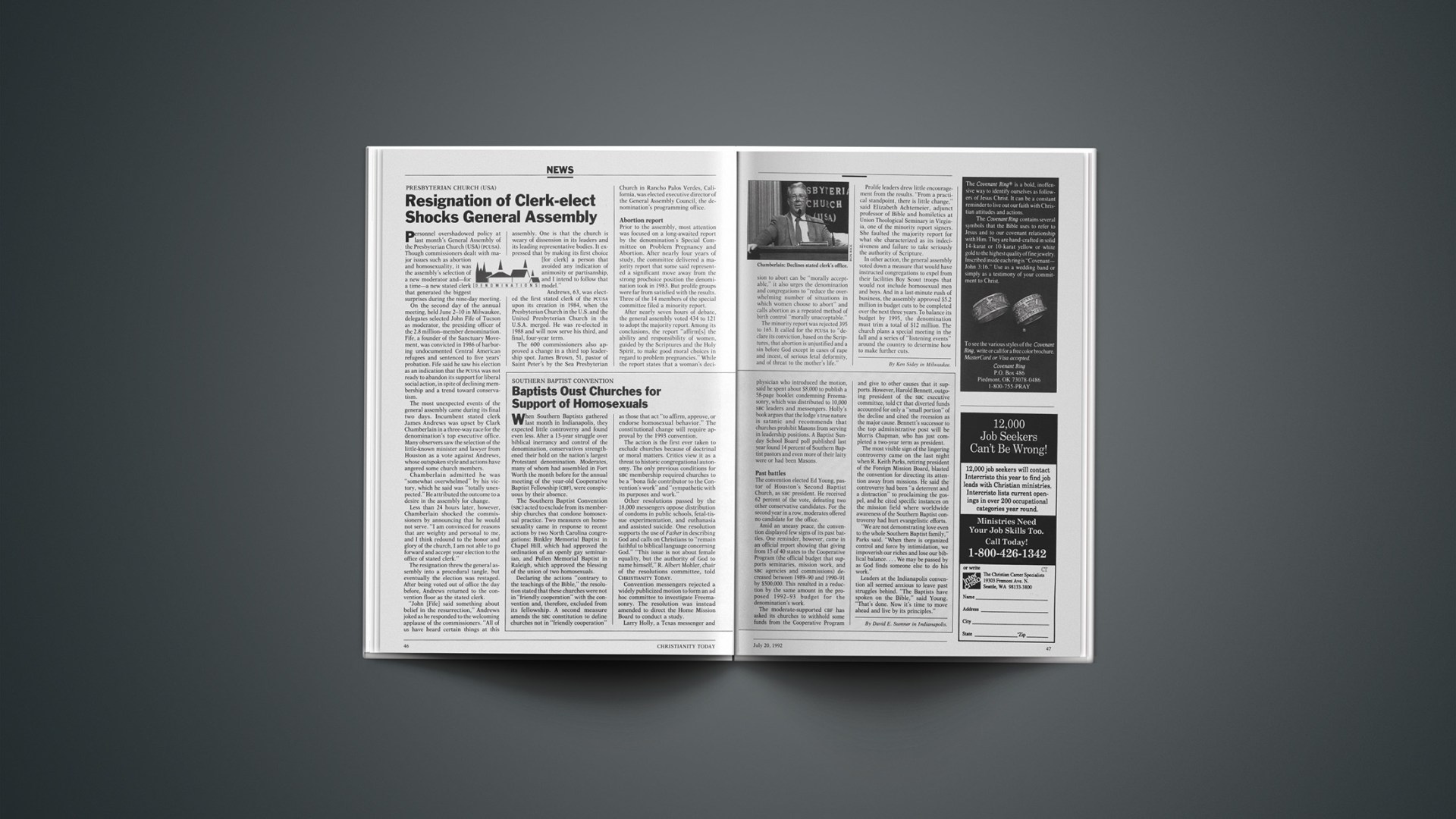Personnel overshadowed policy at last month’s General Assembly of the Presbyterian Church (USA) (PCUSA). Though commissioners dealt with major issues such as abortion and homosexuality, it was the assembly’s selection of a new moderator and—for a time—a new stated clerk 1o that generated the biggest surprises during the nine-day meeting.
On the second day of the annual meeting, held June 2–10 in Milwaukee, delegates selected John Fife of Tucson as moderator, the presiding officer of the 2.8 million-member denomination. Fife, a founder of the Sanctuary Movement, was convicted in 1986 of harboring undocumented Central American refugees and sentenced to five years’ probation. Fife said he saw his election as an indication that the PCUSA was not ready to abandon its support for liberal social action, in spite of declining membership and a trend toward conservatism.
The most unexpected events of the general assembly came during its final two days. Incumbent stated clerk James Andrews was upset by Clark Chamberlain in a three-way race for the denomination’s top executive office. Many observers saw the selection of the little-known minister and lawyer from Houston as a vote against Andrews, whose outspoken style and actions have angered some church members.
Chamberlain admitted he was “somewhat overwhelmed” by his victory, which he said was “totally unexpected.” He attributed the outcome to a desire in the assembly for change.
Less than 24 hours later, however, Chamberlain shocked the commissioners by announcing that he would not serve. “I am convinced for reasons that are weighty and personal to me, and I think redound to the honor and glory of the church, I am not able to go forward and accept your election to the office of stated clerk.”
The resignation threw the general assembly into a procedural tangle, but eventually the election was restaged. After being voted out of office the day before, Andrews returned to the convention floor as the stated clerk.
“John [Fife] said something about belief in the resurrection,” Andrews joked as he responded to the welcoming applause of the commissioners. “All of us have heard certain things at this assembly. One is that the church is weary of dissension in its leaders and its leading representative bodies. It expressed that by making its first choice [for clerk] a person that avoided any indication of animosity or partisanship, and I intend to follow that model.”
Andrews, 63, was elected the first stated clerk of the PCUSA upon its creation in 1984, when the Presbyterian Church in the U.S. and the United Presbyterian Church in the U.S.A. merged. He was re-elected in 1988 and will now serve his third, and final, four-year term.
The 600 commissioners also approved a change in a third top leadership spot. James Brown, 51, pastor of Saint Peter’s by the Sea Presbyterian Church in Rancho Palos Verdes, California, was elected executive director of the General Assembly Council, the denomination’s programming office.
Prior to the assembly, most attention was focused on a long-awaited report by the denomination’s Special Committee on Problem Pregnancy and Abortion. After nearly four years of study, the committee delivered a majority report that some said represented a significant move away from the strong prochoice position the denomination took in 1983. But prolife groups were far from satisfied with the results. Three of the 14 members of the special committee filed a minority report.
After nearly seven hours of debate, the general assembly voted 434 to 121 to adopt the majority report. Among its conclusions, the report “affirm[s] the ability and responsibility of women, guided by the Scriptures and the Holy Spirit, to make good moral choices in regard to problem pregnancies.” While the report states that a woman’s decision to abort can be “morally acceptable,” it also urges the denomination and congregations to “reduce the overwhelming number of situations in which women choose to abort” and calls abortion as a repeated method of birth control “morally unacceptable.” The minority report was rejected 395 to 165. It called for the PCUSA to “declare its conviction, based on the Scriptures, that abortion is unjustified and a sin before God except in cases of rape and incest, of serious fetal deformity, and of threat to the mother’s life.”
Prolife leaders drew little encouragement from the results. “From a practical standpoint, there is little change,” said Elizabeth Achtemeier, adjunct professor of Bible and homiletics at Union Theological Seminary in Virginia, one of the minority report signers. She faulted the majority report for what she characterized as its indecisiveness and failure to take seriously the authority of Scripture.
In other action, the general assembly voted down a measure that would have instructed congregations to expel from their facilities Boy Scout troops that would not include homosexual men and boys. And in a last-minute rush of business, the assembly approved $5.2 million in budget cuts to be completed over the next three years. To balance its budget by 1995, the denomination must trim a total of $12 million. The church plans a special meeting in the fall and a series of “listening events” around the country to determine how to make further cuts.
By Ken Sidey in Milwaukee.










